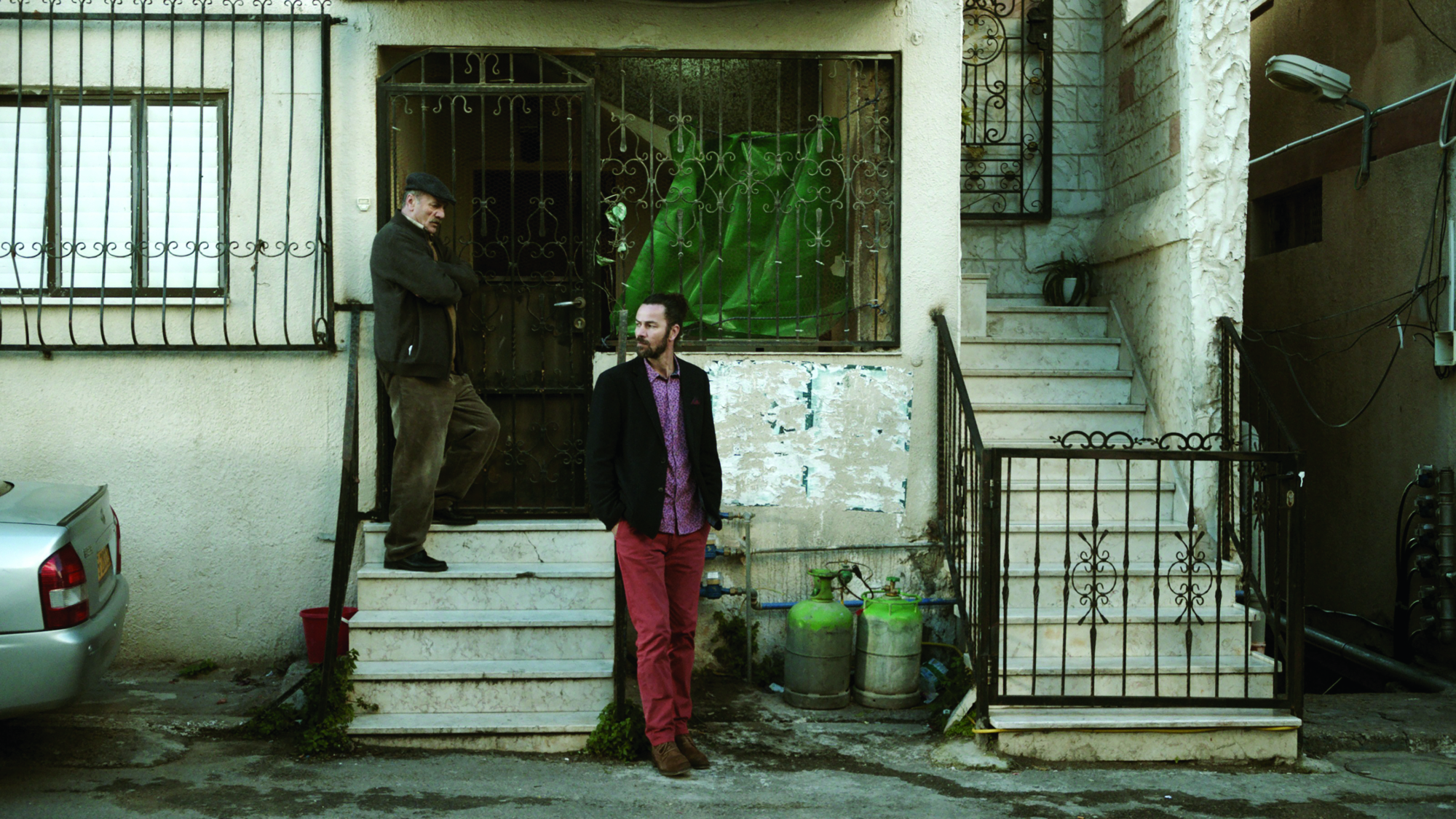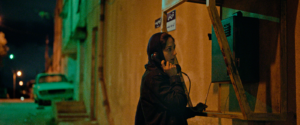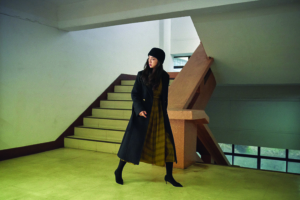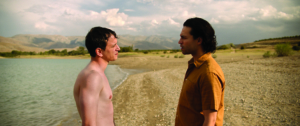It should come as no surprise that Annemarie Jacir’s Palestinian family dramedy, Wajib (2017), revolves around obligation. The title translates, after all, to ‘duty’ – in this case, the Palestinian custom that a father and son, Abu Shadi and Shadi (played by real-life father and son Mohammed and Saleh Bakri), hand-deliver invitations to the wedding of Amal (Maria Zreik), their daughter and sister, respectively. More broadly, Jacir’s film – operating in a lightly satirical tone throughout – examines the familial, cultural and social obligations associated with duty, tying this together into a direct interrogation of idealism and realism in modern Palestine.
Wajib’s narrative, which unfolds as Christmas approaches in Nazareth, assumes an episodic nature as Abu Shadi and Shadi travel from household to household. Jacir’s screenplay maintains audience interest with a string of riveting interludes, but each chapter exists in service of developing both character arcs – Abu Shadi and Shadi gradually discard contrived personas constructed over an extended separation – and a political thesis, with Jacir’s film scrutinising the challenges of maintaining coherent politics within and without tumultuous Nazareth.
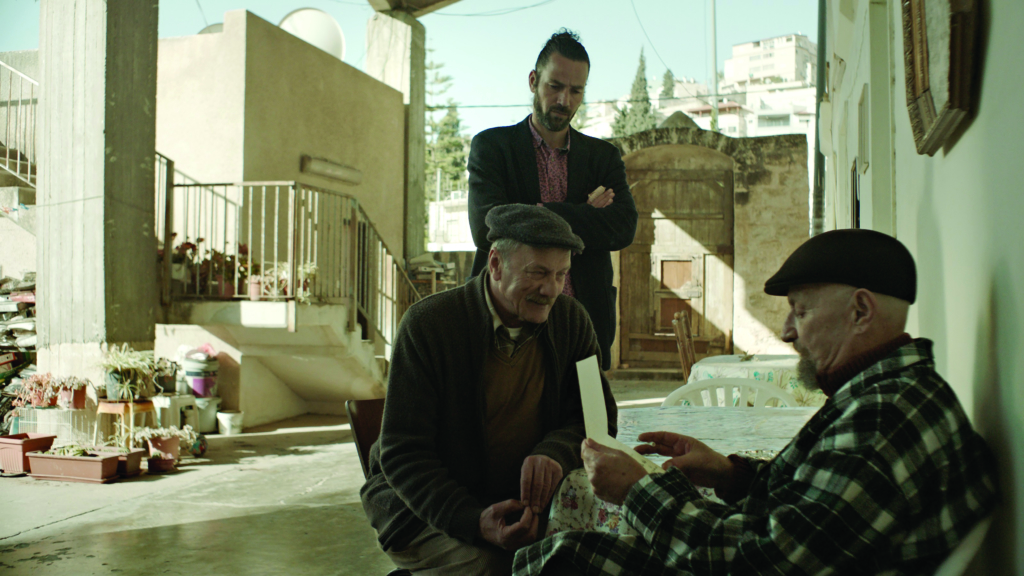
Duty and hypocrisy
First and foremost, Wajib operates as a lighthearted social satire. At its Sydney Film Festival screening, it invited frequent laughter – primarily directed at its pair of protagonists. Both Abu Shadi and Shadi are classic comedic characters, in that each is an almost-incorrigible hypocrite. Abu Shadi is fastidiously obsessed with social status. As a prominent teacher, he embraces the reverence doted on him by former students. As a father, he boasts of his son’s non-existent medical career; in reality, Shadi is an architect, which – to his father’s mind – isn’t quite as prestigious. ‘It’s easier to let people think what they want,’ Abu Shadi chides his son when he objects.
Shadi assumes a similar air of superiority; since emigrating to Italy, he has regarded himself as above the minutiae of Palestinian society, frequently condemning beautiful architecture spotted with ‘tarp and plastic chairs’. His flamboyant outfit – salmon pants, pink paisley shirt, dark blazer and obligatory pocket square – comes across as a purposeful challenge to his friends and family, carving out a comparatively conservative Christian niche within Nazareth. As an audience, we’re encouraged to laugh at each man’s pretences rather than sympathise with them; we’re positioned as observers, which only serves to underline the artificiality of the obligations facing these men.
Duty is driven by moral approbation – the need to do ‘the right thing’ without having to think too carefully about the underlying ethical complexities. As Abu Shadi informs an infirm invitee, ‘We know you can’t attend. But duty is duty.’
Both are driven by the need to be better, the need to assert moral authority. Their interactions throughout the first half of the film are primarily passive-aggressive positioning: Abu Shadi regularly seeks to pair up his son with available Palestinian women, casually negating the existence of Shadi’s Italy-based Palestinian girlfriend, Nada. Shadi, meanwhile, takes every opportunity to challenge Abu Shadi, whether it be about the choice of musician for Amal’s wedding or his father’s smoking habit (which Abu Shadi resolutely, and unconvincingly, denies). It’s telling, then, that, despite Shadi’s disdain for Nazarene society, he has no objections about travelling from house to house delivering invitations. Duty is driven by moral approbation – the need to do ‘the right thing’ without having to think too carefully about the underlying ethical complexities. As Abu Shadi informs an infirm invitee, ‘We know you can’t attend. But duty is duty.’
It isn’t until roughly the film’s midpoint, as the pair travel into the Israeli district, that this kind of unthinking obedience is questioned. The first challenge arises when Shadi learns that his father intends to invite Ronnie Avi to the wedding. Ronnie is a Mossad agent (or, in Shadi’s words, ‘a shitty Zionist coloniser’), and was responsible for Shadi’s interrogation and departure from Palestine as a result of the latter’s membership to a ‘political’ cinema club. When Shadi’s unable to convince his father not to invite the agent, he storms away from the car. ‘Ronnie has to improve my position,’ Abu Shadi meekly offers by way of explanation when his son rejoins him. ‘You know how it is.’
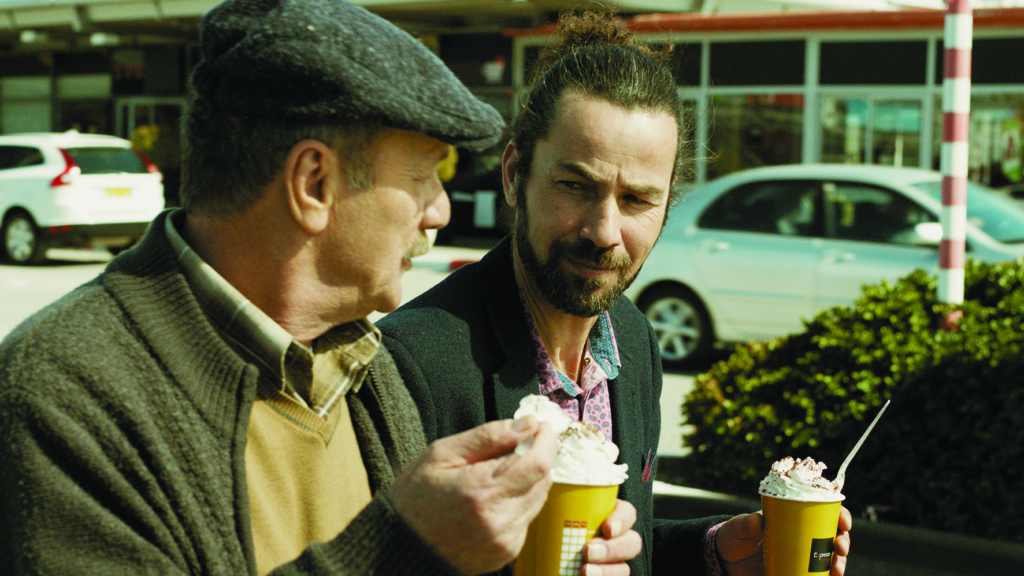
Realism and idealism
‘You know how it is’ might as well be Abu Shadi’s motto for life in Nazareth. He frames his inviting the man who tortured his son to his daughter’s wedding as an unfortunate social obligation – another coiled branch of ‘duty’. A subsequent incident in the Israeli district underlines that this isn’t a mere matter of a father following social rules and a son rejecting them. When Abu Shadi accidently hits a dog with his car, he immediately flees the scene. ‘You know what happens in this country if you hurt an animal? Especially an Israeli one!’ The dichotomy between father and son becomes clear: Abu Shadi is a realist, doing his best to avoid persecution in a tense region; Shadi is an idealist, at once disgruntled by his treatment at the hands of Mossad and inspired by the Palestine Liberation Organization (PLO) rhetoric he’s embraced outside of his homeland.
It’s also around this point that the film’s focus shifts away from the tense family comedy and towards its politically pointed subtext. It’s hard for a Palestinian film to not be at least partly political, but Wajib does well to allow Abu Shadi’s and Shadi’s differing viewpoints to reflect broader debates without feeling entirely allegorical. The father represents the challenges of living within Palestine, while his son represents a romanticised view of Palestinian resistance whereby good intentions clash with the complexities of reality. Rather than offering up an overt argument, the second half of the film instead reflects on the challenges of subversion within and without a society, questioning both the father’s integrity and the son’s naivety.
Jacir may avoid providing an explicit position on the broader politics, but these characters’ absence allows us to overlay our own opinions on Israeli–Palestinian relations onto the film’s pragmatic/romantic dichotomy and subsequently reflect on the complexities of the situation.
Abu Shadi’s insistence in inviting Ronnie to save face comes across as congruous with his characterisation as a vain old man obsessed with his image. This is a man who lies to his son about smoking – even as cigarette smoke still lingers in the car – and happily chats about Shadi’s fictitious medical career because it makes him look better. Yet I think it’s erroneous to argue that Abu Shadi’s deference to Israeli authorities is simple cowardice. The consequences facing Shadi for his involvement in a film club are evidence enough that one missing wedding invitation might have dire results.
Yet the film suggests that Abu Shadi is complicit in encouraging his son’s own idealism regarding Palestine, that he sympathises with Shadi’s beliefs – if not his intended (in)action. That’s clarified by a scene in which Abu Shadi talks on the phone to Nazir, Nada’s PLO-aligned father. Standing before an unappealing tableau of trash and Christmas ephemera, Abu Shadi regales Nazir with a story of ‘orange trees and villagers’ – a postcard-perfect vision jarring with the reality. Yet, only minutes later, he rebukes his son for indulging in the same sentimentality: ‘What’s this Palestine you keep talking about? Where is it? I live in it!’

Naturally, since this is narrative cinema, the two men’s differences are reconciled by film’s end. As the sun sets on Nazareth, father and son settle in for a deeply symbolic cigarette, compromise and denial and toxic ideology wrapped up in its tobacco leaves. Looking out on the ancient architecture, Abu Shadi begrudgingly agrees with his son that it looks better without the tarpaulin. Nothing is entirely resolved, but you realise that more unites these men than separates them. They’re drawn together not just by blood, but also by their fondness for their home country, and their recognition of the insurmountable challenges facing the modern Palestine.
This scene should sing. It should marry familial conflict with political strife, offering thoughtful reflection if not resolution. But, despite the strength of the actors’ performances – being real-life father and son can’t hurt the authenticity – their characterisation is too shallow for the emotional climax to truly resonate. I’d place responsibility for this at the feet of Wajib’s episodic structure: while the frequent visits provide narrative momentum and aid in colouring in the complexities of Nazareth society, they distract from rich character development. It doesn’t help that Abu Shadi and Shadi are too rigidly aligned with their viewpoints – coming off largely as mouthpieces for pragmatism and idealism rather than fully fleshed out characters.
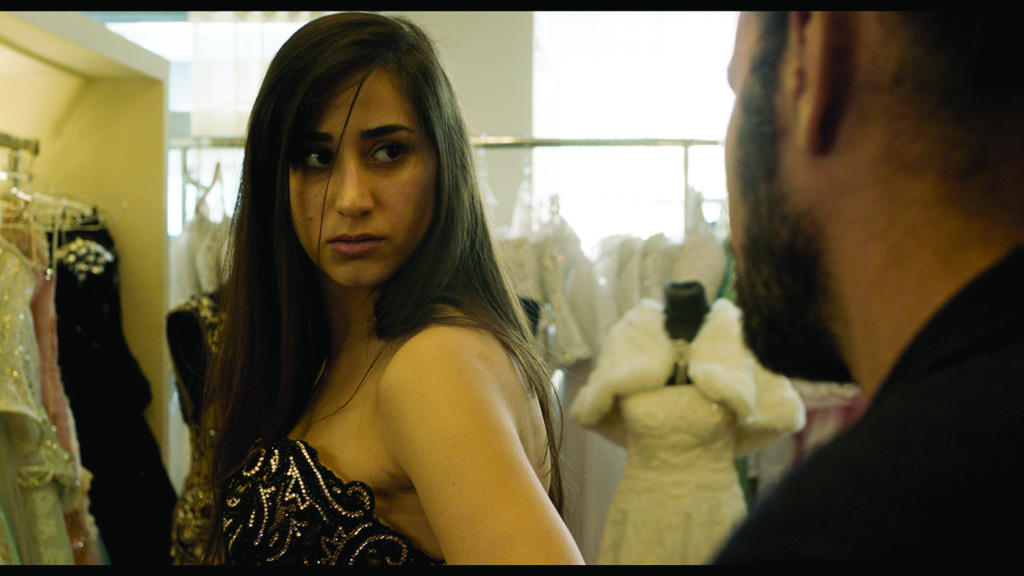
Representation of absence
No doubt Jacir would object to my characterisation of the Nazareth inhabitants whom Abu Shadi and his son encounter in the interstitial scenes. ‘I don’t think anybody represents anybody,’ she told 4:3 during the Locarno Film Festival. ‘None of the women represent women. Nobody represents anything except for themselves. Talking about the women, they’re just women I know.’[1]Annemarie Jacir, quoted in Jeremy Elphick, ‘Wajib – an Interview with Annemarie Jacir’, 4:3, 1 September 2017, <https://fourthreefilm.com/2017/09/wajib-an-interview-with-annemarie-jacir/>, accessed 13 August 2018. While we’re given little time to know these Palestinian supporting characters – from the effeminate man that Abu Shadi speculates is a ‘homo’, to the young woman who wastes little time attempting to seduce Shadi – they do, certainly, paint a distinctive portrait of the Palestinian community: one defined by Christmas and tarpaulins rather than protesters and soldiers. My complaint is that the limited screen time given to each individual flattens their characterisation; the gossiping hairdresser might be a woman that Jacir knows, but, even as part of a culture far removed from my personal experience, she comes across as a cliché.
I’d argue that Wajib’s most compelling characters remain off screen. There’s Shadi’s aforementioned girlfriend and her PLO-supporting father. We can only infer bits and pieces about Nada and Nazir: she can’t visit Nazareth without a European passport, implying her own history of political protest, while Abu Shadi’s previously discussed phone conversation with Nazir speaks volumes about Nazir’s own idealistic view of Palestine. Jacir may avoid providing an explicit position on the broader politics, but these characters’ absence allows us to overlay our own opinions on Israeli–Palestinian relations onto the film’s pragmatic/romantic dichotomy and subsequently reflect on the complexities of the situation. It’s hard to walk out of the cinema without reconsidering our own opinions with a degree more detail.
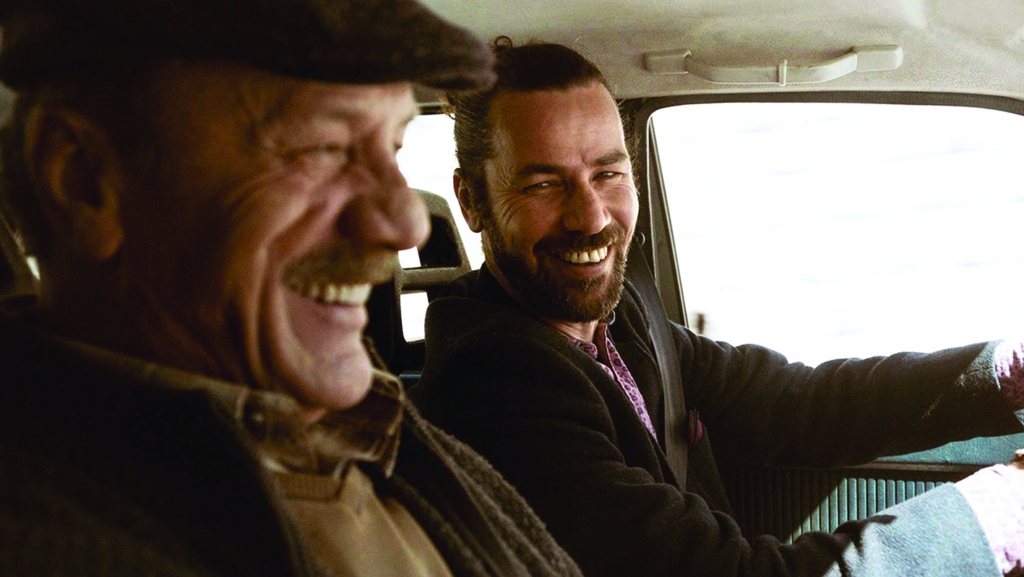
But the most interesting and important person in Wajib is Shadi’s mother and Abu Shadi’s ex-wife. As the film progresses, we learn that she left her husband (and her country) for another man, abnegating her familial and cultural duties. That’s left a crater in her family – the rift between Shadi and his father makes far more sense when you realise this is the first time they’ve met in person since she left – and the broader community: she’s, perhaps unsurprisingly, the subject of the hairdresser’s sotto voce gossiping. Her disappearance and disconnect from the Palestinian community also implies, if inadvertently, a severance from any political duty. Yet there’s something freeing, even admirable, about Shadi’s mother’s departure. You sense that from Shadi himself; as Jacir notes, ‘Abu Shadi feels that his son respects [his ex-wife] more than him. She did what she wanted to do, and he didn’t.’[2]ibid. When you ponder the futility – and occasional ridiculousness – of the duty that Abu Shadi and Shadi’s culture demands of them, hand-delivering invitations to often-unappreciative friends and relatives out of old-fashioned obligation, the absent mother’s decision makes a lot of sense. As Shadi says to his father, ‘At least she did what she wanted and not what society wants.’
Ultimately, however, Wajib asserts the importance of duty – of compromising one’s own ambitions to meet obligations. As much as the father and son’s reconciliation might not resonate as much as it could have, what does unquestionably succeed is the film’s wordless acknowledgement that Abu Shadi’s vanity, his arrogance and his bitterness stem from what he could have given up – and didn’t. Duty, particularly that which we associate with a foreign culture, might sometimes appear foolish, even comical. But the obligations woven through such duty – obligations that are challenging, obligations that require compromise – are no laughing matter.
Endnotes
| 1 | Annemarie Jacir, quoted in Jeremy Elphick, ‘Wajib – an Interview with Annemarie Jacir’, 4:3, 1 September 2017, <https://fourthreefilm.com/2017/09/wajib-an-interview-with-annemarie-jacir/>, accessed 13 August 2018. |
|---|---|
| 2 | ibid. |
